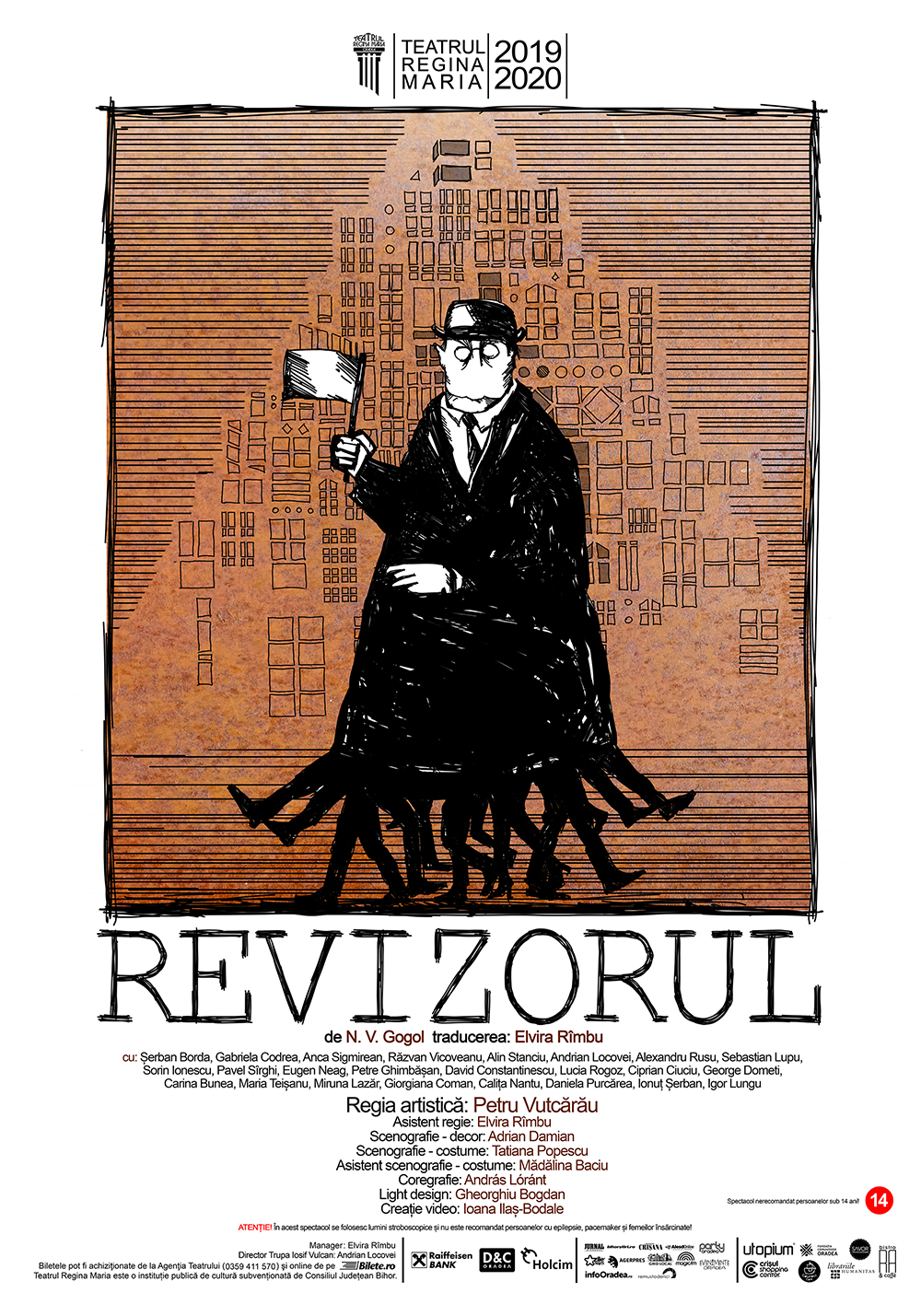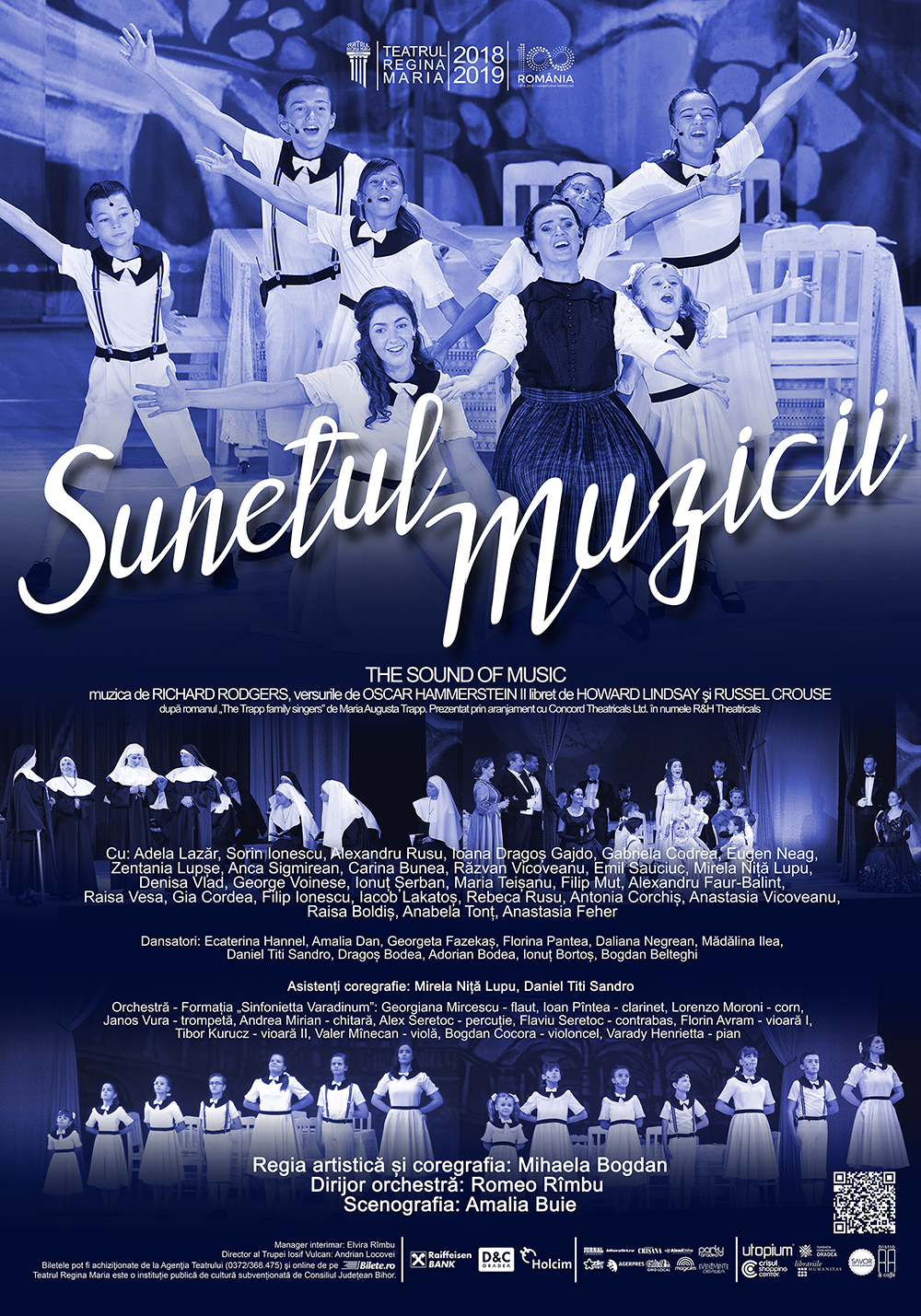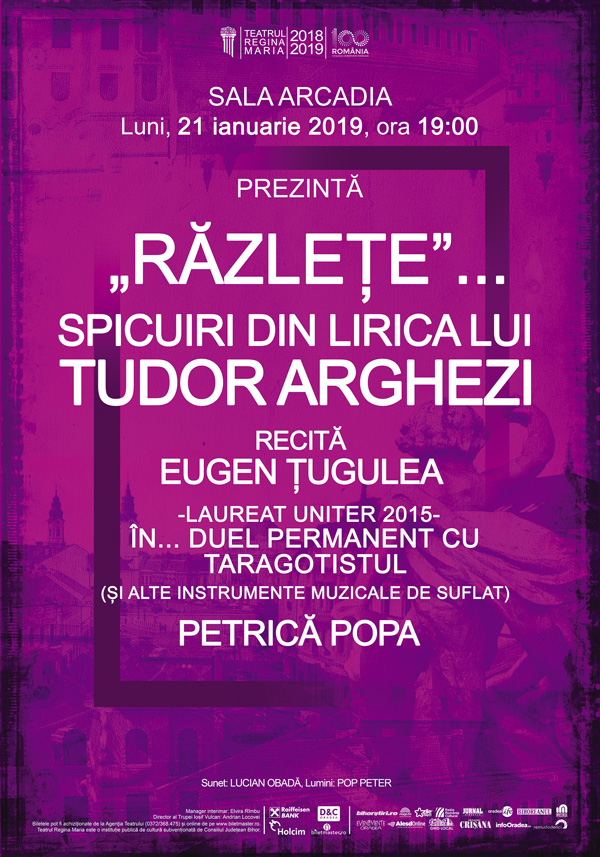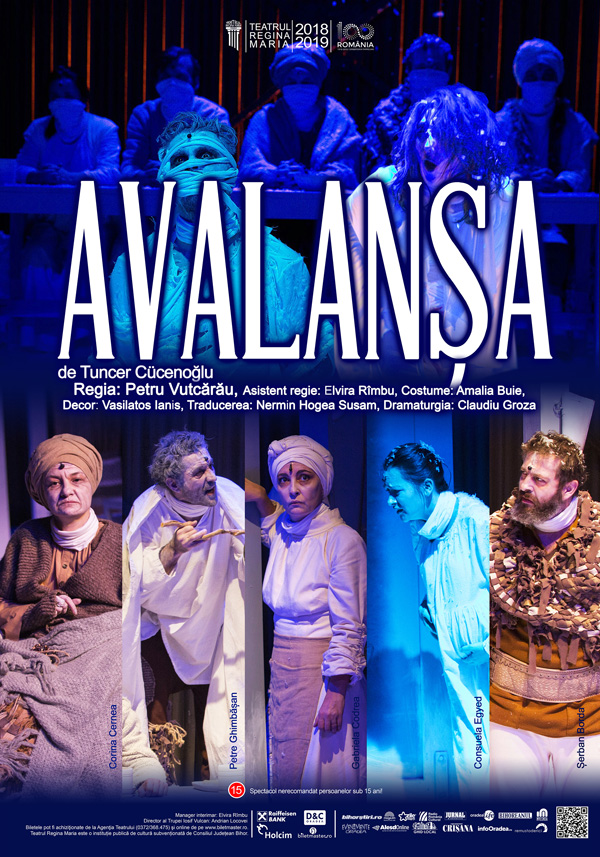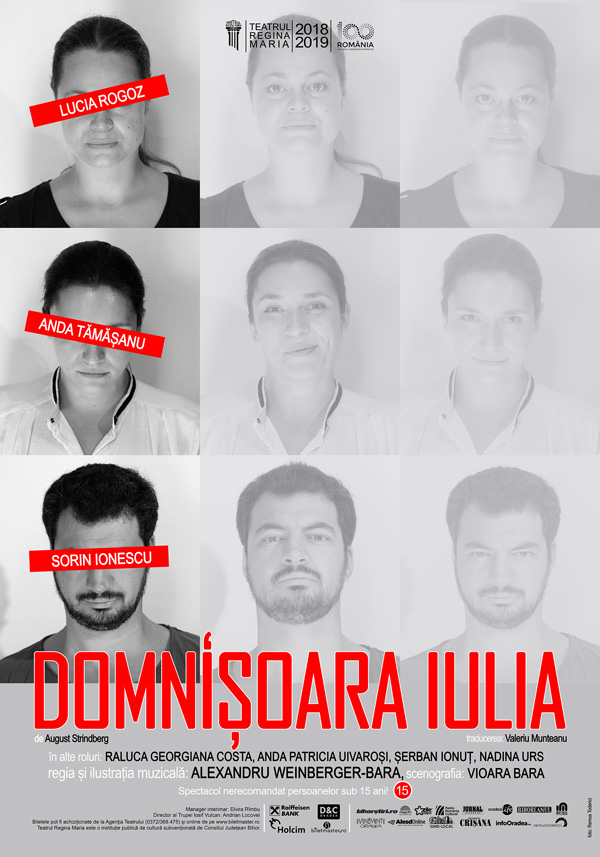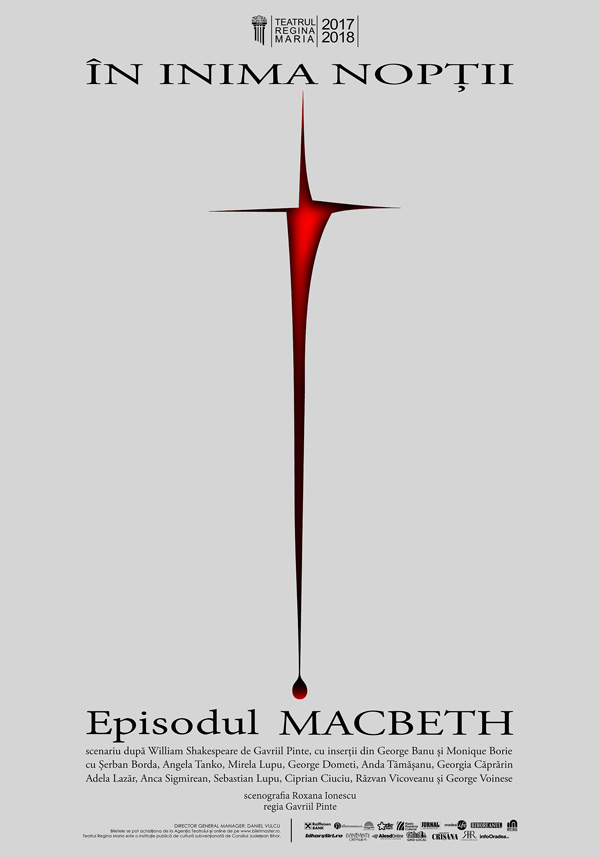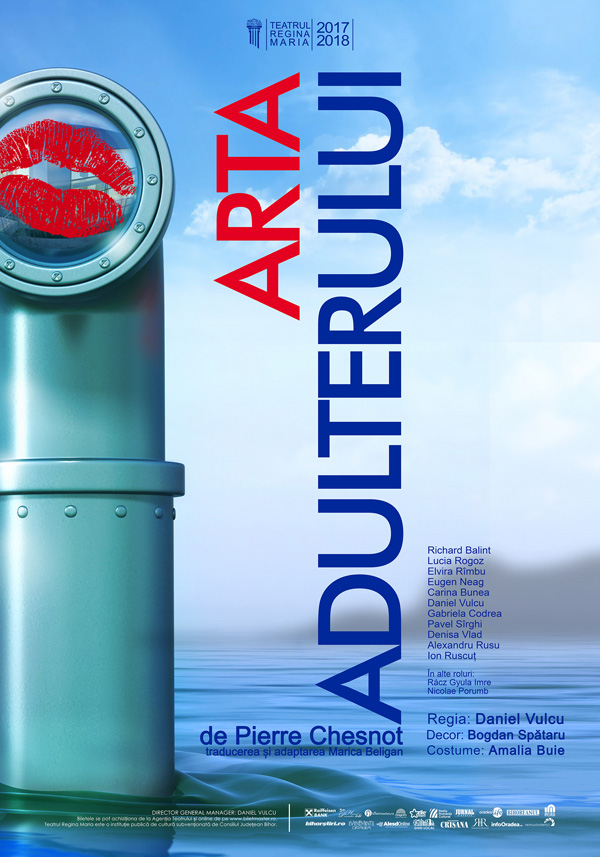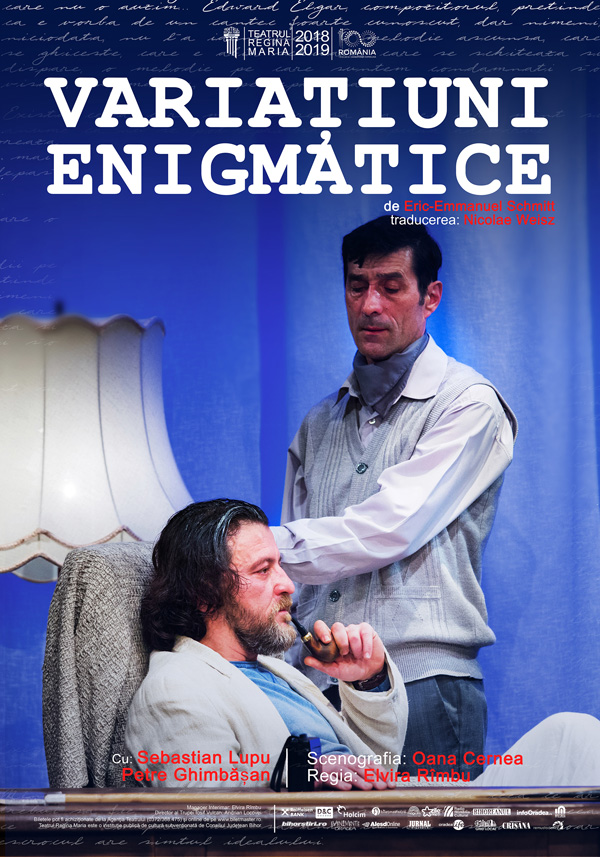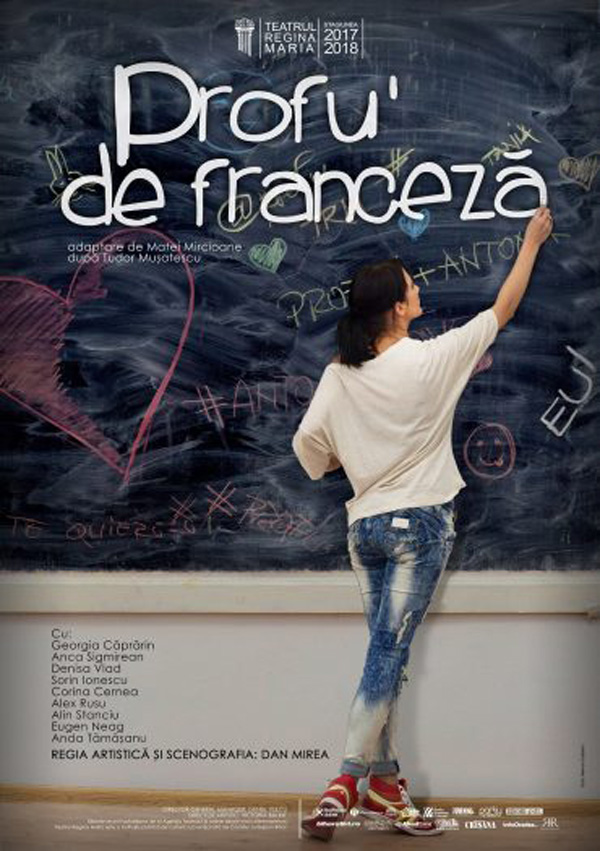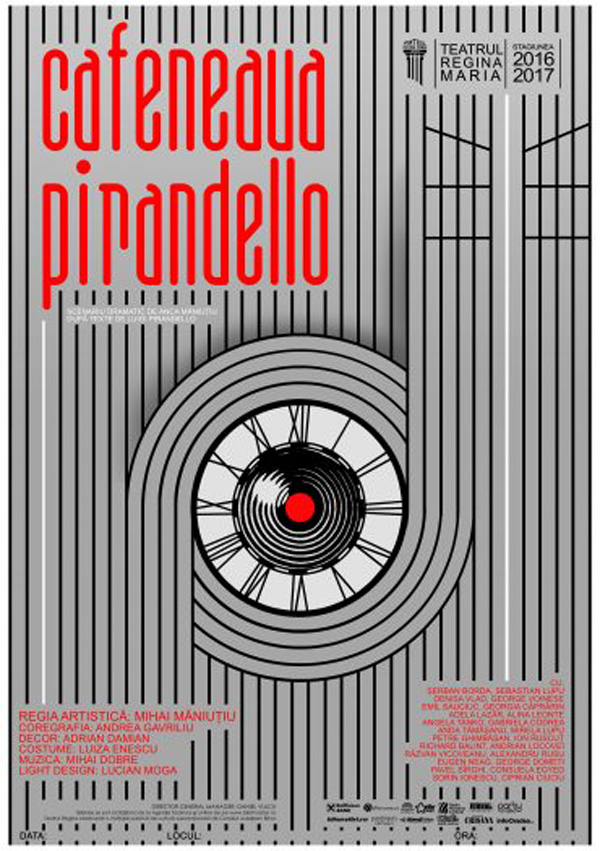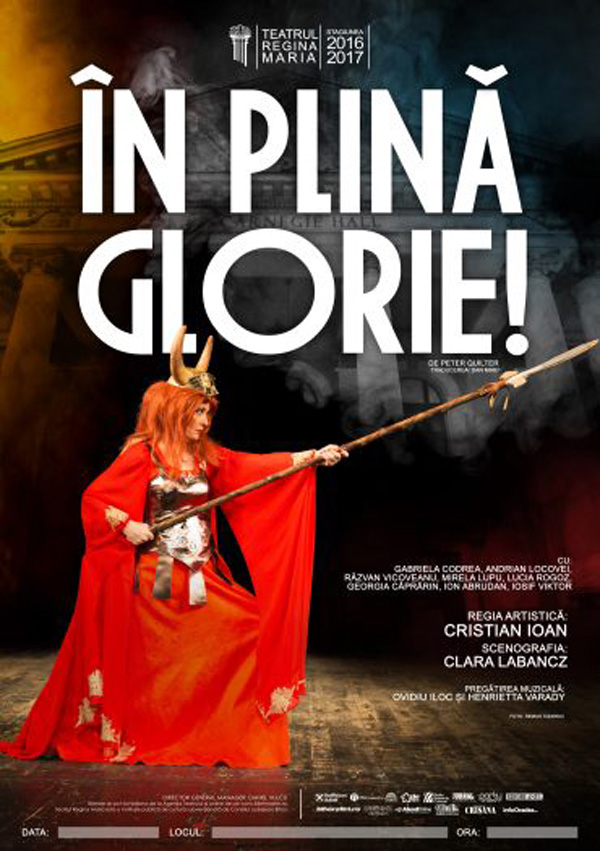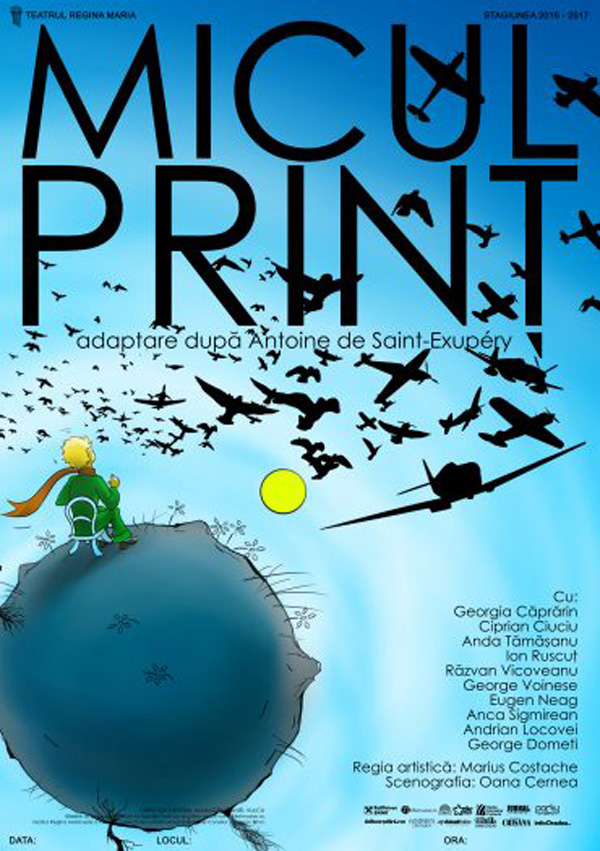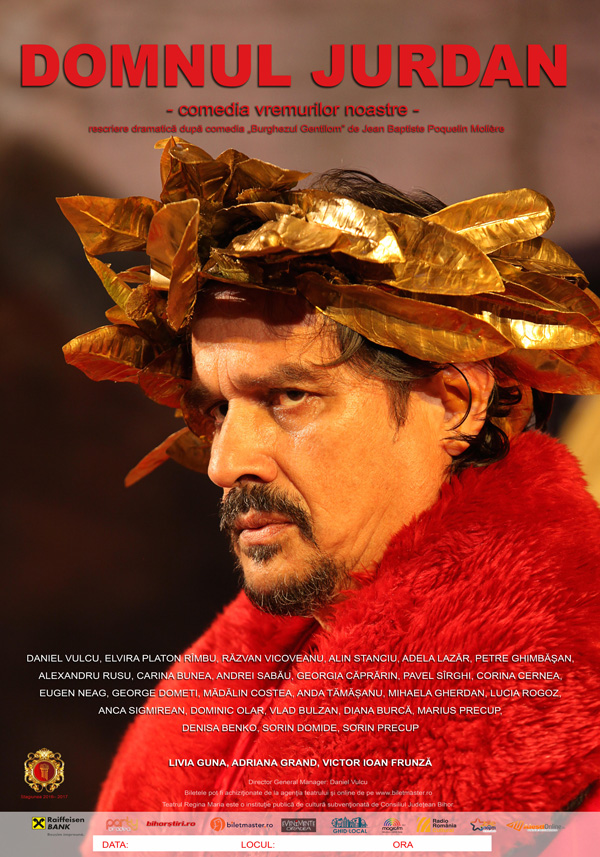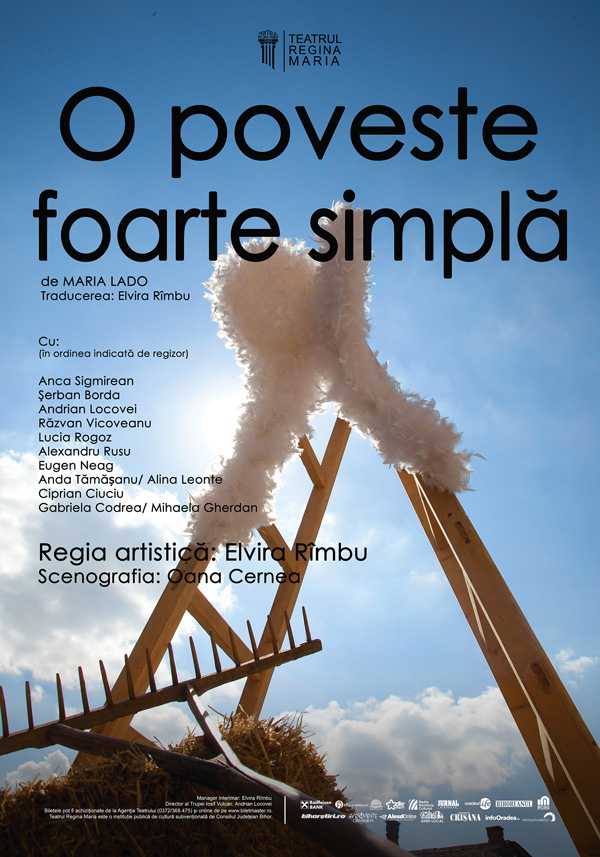Spectacole
- Details
- Category: Spectacole
by N. V. Gogol
The "Government Inspector " is a satire, a comedy of morals and errors, which is part of the category of texts whose contemporaneity does not degrade over time; being a literary caricature of human defects, its actuality will cease with the disappearance of man ... In the show "The Auditor" we have as protagonists the corrupt officials from a Russian provincial town, led by the mayor, who receives disturbing news: a Government Inspector will arrive incognito in their city to conduct some investigations. The clique activities risk being discovered, thus, each of those involved assumes their own corrupt deeds and tries to correct them according to the possibilities. In the process of organizing the cover-up, they receive the news that a suspicious individual has arrived at the inn, showing the behavioral signals of an inspector...
- Details
- Category: Spectacole
by Lucas Hnath
Today is a very important day for Pastor Paul`s congregation. The church he leads is now "a congregation of thousands with classrooms for the Sunday School and a baptismal font as big as a swimming pool", and he sits in front of his audience in order to tell them that, today, all the costs for this constructions are paid. But Paul also has other news, that doesn`t follow the pattern which the church community is used to...
- Details
- Category: Spectacole
Music by RICHARD RODGERS
Lyrics by OSCAR HAMMERSTEIN II
Book by HOWARD LINDSAY and RUSSEL CROUSE
Suggested by "The Trapp Family Singers" by Maria Augusta Trapp
Presented by arrangement with Concord Theatricals Ltd. on behalf of R&H Theatricals
In Austria`s 1930s, Maria Rainer, a rebellious teenager, retires in the mountains, to the Nonnberg monastery, with the intention of embracing the monastic life. Mother Abbess, however, realizes shortly that the girl has no vocation for the chosen path, and urges her to give another chance to worldly life, promising that he will receive her with open arms if the attempt fails. At the recommendation of the abbot, Maria becomes governess in the house of the captain of the Austro-Hungarian Navy, Georg von Trapp. A retired officer, a widower, Georg raises his seven children alone, who, despite the military education they received from their father, manage to scare all the governesses. In the captain's house, Maria will bring joy and ... music, managing to conquer the hearts of the little ones. After a while, Maria realizes that she fell in love with Georg, although he is engaged to the young and beautiful Baroness Elsa Schraeder. Frightened by her own feelings, the girl will return to the monastery. But the war will inevitably change her destiny, bringing her back face to face with the man of her dreams and with a new challenge: escaping from the Nazi regime.
- Details
- Category: Spectacole
written by Tudor Mușatescu, directed by Claudiu Goga
"Politics is like fashion! It evolves, it changes, it transforms. Loyalty in politics is just an endless series of adulteries!”, says the main character from ... Escu to justify his political shuttle. Tudor Mușatescu wrote his play in 1933, one year after Titanic Vals, but its heroes seem like people today.
The children of Spirache Necșulescu, the insignificant functionary of Titanic Vals, winner in elections because he says: "Do not choose me!", does not resemble their father at all. Miza, the eldest daughter, is a "wife of a general", the other girl, Gena, is a wife "of the president of the court". And Decebal is ... a politician. Demagogue, greasy, unscrupulous, would do anything to become a deputy. He did enough, as he calmly tells his father-in-law:
«LANGADA (determined to burst "once and for all "): Didn't you make me a liberal when I was a conservative?
DECEBAL: Because the interests of the state demanded that my family be liberal at that time.
LANGADA: Yes ... but you see that you changed parties and I am the fool in this situation. There it is! I can't say a word anymore. Neither at the cafe nor at the club ... anywhere. Whole life as I was a conservative, everyone told me only "Master Iorgu". Now - since you joined the family and messed with the new political currents, - they call me "rat", "rookie", "technician" (...) »
- Details
- Category: Spectacole
An exceptional performance that creates the ideal context for a fascinating journey in the world of poetry. The recital is sustained by the actor Eugen Țugulea, and its meaning is to conserve and, at the same time, bring back into the attention of the audience in Oradea the literary work of one of the most prolific and beloved Romanian poet: Tudor Arghezi. The actor`s voice is accompanied by the artistic efforts of the musician Petrică Popa.
Premiere: January 21, 2019
- Details
- Category: Spectacole
adaptation after Nedialko Yordanov, directed by Petru Vutcărău
Many writers tempted along years to re-write, complete, add their own vision to famous classical texts. The Bulgarian playwright Nedialko Yordanov used Shakespeare’s “theatre in theatre” technique to re-write “Hamlet” in a particular way.
The actors called at Elsinore to comfort prince Hamlet’s illness are witnessing what happens at the palace. Why they couldn’t be the “storytellers” themselves? This is the plot Yordanov uses to describe the faith of the Artist – a rather sincere, honest and a bit naïve person – in a despotic world, ruled by lie, hypocrisy, opportunism. A world in which the Artist – the “fool”, we can say – is killed. Though – and the kings know it – you are not allowed to punish the fool…
“Hamlet’s Trap” is a modern vision on Shakespeare’s “Hamlet”, written with good humor, with some innuendos getting the spectator directly in the theatre’s “kitchen” – rivalry between actors, jealousy, grieve. It is also a metaphor for nowadays about oppression, about the guilty silence, about the need to say the truth no matter what the consequence is. Even if, at the end of our stage story, the brave actors themselves are becoming “protegees” of the system…
- Details
- Category: Spectacole
written by Tuncer Cücenoğlu, directed by Petru Vutcărău
The Avalanche is a story about fear, but also about the past and the future, about the conservative tradition and change of mentalities. Tuncer Cücenoğlu created a distracted and symbolical history: in a closed community, with very rigid rules, someone could be murdered if endangers the others’ lives. The law that avoids death trough death brings up other questions: about the social ethics, about rusting in tradition, about dreaming for a free and unconstrained life. This is the plot here, but the theme could reverberate far away, even to the whopping realities of nowadays…
- Details
- Category: Spectacole
Written by August Strindberg, directed by Alexander Weinberger-Bara
Miss Julie is text considered a masterpiece of Strindberg – relies on the revelation of the human nature with all the „patches of the soul”, as the playwright writes in the preface. Strindberg's argument presents a very modern vision of the theater a century ago, and the intrigue goes on several levels. We are facing a conflict of social and gender classes, beyond a very pregnant erotic horizon and paced in the foreground. Julie is a declining nobility class, through the ”degeneration” of individuals, while Jean is the exponent of a new middle class, ascending, with good reflections and able to learn quickly. Strindberg can't fail to be a misogynist in the preface, so it's clear that the main source of the text is an erotic one and autobiographical.
The director, Alexandru Weinberger-Bara, which debuts with this show on the stage in Romania – has articulated a strong artistic discourse with a stake on actors, which also takes into account the sexual tension of the event, but also its social dimension and posture of victims still incapable of emancipating the heroes. A show about (almost) impossible escape...
Groza Claudiu
- Details
- Category: Spectacole
How long do two young passionate people need to fall in love with each other?
Subtitled "Farce in an act," "The Bear" reveals in a concentrated, comic-ironic way, an essential part of human nature, suggesting how close sometimes anger and passion are. The conflict between the officer Smirnov and Popova landlorde records a series of sudden passes from the quarrel to the preparations of a duel between the two and then the abandonment of Smirnov to struggle with the landlorde he falls in love with.
„Marriage proposal” comes alongside „The Bear”, using the same cast and related directorial elements. The story goes naturally to the continuation of the one started in the first play. Thus, if in the previous play two young people pass unconsciously from hate to passionate love, in ”Marriage proposal” things are taken further. A. P. Cehov captures the initiative of Ivan Vasilievici Lomov, who wishes to marry his neighbor's daughter.
However, far from the romanticism and harmony that is supposed to govern such a unique moment, the potential wedded pair, strive fiercely for ridiculous reasons. The clash of their powerful personalities, the hypochondriacs of the future groom, the trouble through the bride's father passes, and his desperate attempts to apprehend the outbursts of the two young people give rise to a comic situation.
- Details
- Category: Spectacole
a script by Gavriil Pinte after William Shakespeare, with inserts from George Banu and Monique Borie, Directed by Gavriil Pinte
Macbeth Episode – Obsession of Power
This episode closes the trilogy „In the Heart of the Night”, after Hamlet Episode and Lear Episode.
Only the key-lines were kept from the original text. The missing parts are supplanted by physical actions that the play is supposing or that could be imagined. The link between some sequences and also the analyze of several important elements belongs to George Banu and Monique Borie.
We are following two people, Mr. and Ms. Macbeth, gone on the path without return of self-destruction. The projections of these tormented souls could take strange forms. Thus, the witches are signs of old hidden aspirations, a surrogate of desires that come back obsessively.
We play theatre at night form the fear of Night itself. And also due to our desire to forget the day’s wanderings. We play to save ourselves! Night and day. Forever and ever at a crossroad…, as George Banu says.
- Details
- Category: Spectacole
Written by Pierre Chesnot, Directed by Daniel Vulcu
The lie is available to anyone, but only a few succeed in transforming the process of forgery of truth into a science. The ability to get the other to fall into the woven net wisely of carefully chosen statements and charming behavior can indeed become an art.
The adultery relationship between Jean Francois, a film director and his mistress, Nathalie, is about to be discovered by his wife, and the efforts made by the two lovers to create the picture of a suspicious situation, exceed normal limits. Jean Francois is forced to implement his directorial skills and create a space for the truth.
- Details
- Category: Spectacole
by Nicola Wilson, directed by Horia Suru
When a simple choice can change your entire life, what do you chose? To know, or not to know if you have the Familial Alzheimer`s Disease? Do you, or do you not share this information with your future partner?
The vivacity of Vera`s family fades when she decides to reveal to her husband and kids that she already feels some of this affection`s symptoms, but just for a short period of time. The main characteristic they all have, subclassing the F.A.D. (Familial Alzheimer`s Disease) gene, is their ability to consciously avoid taking something too seriously, even in the most misfitting moments. Their predisposition for irony gives them a legerity that we can find only in extremely intelligent people, as the members of this family are. Thus, amongst Scrabble games, memory losses and banterings, their life continues to be extremely active.
The antinomic feelings of the characters are well expressed through music and choreography, and the variety of unexpected situations acquires a positive and motivational vibe.
- Details
- Category: Spectacole
by Eric-Emmanuel Schmitt, Directed by Elvira Rîmbu
A professional meeting between two intelligent men, the writer Abel Znorko (Sebastian Lupu), Nobel Prize for Literature winner, and the journalist Erik Larsen (Petre Ghimbășan), becomes suddenly a spoken chess match. Both strong and dominating personalities, they are playing changing the power shift as each one moves. The meeting is getting a labyrinth form, designed with refinement and a good feeling of the suspense.
The show is directed by Elvira Rîmbu, who directed also ”A very simple story”; on the stage, there are two remarkable actors, that formed during the time a strong duet, able to surprise the public through the subtle and witty shades of their characters. The complex scenography is created by Oana Cernea. This team creates a surprising and vital production.
- Details
- Category: Spectacole
Adaptation by Matei Mircioane – after Tudor Mușatescu. Artistic Director: Dan Mirea
The twelfth grades, funny and entertained, have part of the agitation caused by the imminence of the baccalaureate exam. Beside that, there is another tension, created by the appearance of the new French teacher, „cool, young, brunette, tall...”, in whose person girls discover an Adonis, and boys a rival.
This novelty gives rise to tense situations, for which it is necessary to intervene even the class master, whose interes tis also directed to the young techer. The naivety from which the misunderstandings erupt, creates the comic situation, making an original, cheerful and lively show.
Both the events themselves and the way in which are staged, put the show in a „cloak” of universality, accessible to public, which, regardless of age, will easily succeed in identifying or empathizing with any of the characters.
- Details
- Category: Spectacole
dramatic script by Anca Măniuțiu – featuring texts by Luigi Pirandello, directed by Mihai Măniuțiu
“Pirandello café” starts from the dramatic script made by Anca Măniuțiu, structured on two plays that belong to the playwright Luigi Pirandello: The man with the flower in his mouth and The mountain giants, which contains in its intertext entwining disparate lines from Six characters in search for an author and Tonight we improvise.
Pirandellian characters, spectrally designed in an abandoned late-night coffee shop, located – not unintentionally – close to the railway station, they meet and unleash an absurd world, where the boundary between dream and reality becomes fluid. In this ghostly frame, it infiltrates a group of circus artists that stimulate the atmosphere and gives the performance a comic touch. Word, in a world governed by oneiric, plays a secondary role, and music, but must of all the choreographic language assumes its illustrative dimension.
“The performance tries to catch a hallucinatory world, fantastic, governed by oneiric, where the boundary between reality and dream (or nightmare) is extremely fragile. In conceiving the script, I started from Pirandello`s obsessions, expressed in all of his dramatic writings. These refer to versatile, difficult to quantify ratios, between theatre and life, to the impossibility of fixing life – as a constant, unbridled flow – into the conventional patterns and our social masks (or in the well-defined identity of some characters). From here, questioning our own psycho-emotional identity and of reality itself, which slips from our grasp. From here, the vague psychological consistency of the characters and their fundamental inadequacy to reality. “Pirandello café” is the materialization of an emblematic metaphor and an of ancient theatrical motif: life is a dream.” Anca Măniuțiu
- Details
- Category: Spectacole
By Peter Quilter, Artistic Director: Cristian Ioan
„Glorious!” is a comedy inspired by the life of Florence Foster Jenkins, known in history as the worst opera singer in the world, attributing to her the ironic title of „First Lady of the glissando”. Passionate with music until pathetic, despite the irony of some and the ridiculous desire, she succeeds and her concerts are sold out. The climax of his career is the recital on one of New York's most prestigious concert venues: Carnegie Hall. Her success wouldn't have been possible without the financial resources at her disposal and the support of some devoted friends. An extraordinary show, where the border between courage and naivety disappears. A character willing to give up anything to fulfil her dream. A humorous story, which, paradoxically, has made history and managed to inspire even today.
- Details
- Category: Spectacole
Adaptation from Antoine de Saint-Exupery, Artistic Direction – Marius Costache
„The Little Prince” is one of the most famous and beloved literary works, being translated into more than 250 languages and dialects and adapted to many other art forms, including theater. But the charm that Saint Exupery's story exerts on readers goes beyond the linguistic and artistic boundaries, but also a much more significant: the age.
Director Marius Costache managed to recreate the delightful universe of the story on the stage of Queen Marie Theater, preserving the specific candor, but also the profoundly philosophical side of the work. The show, therefore, is not only for the middle-aged children but also for the teenagers who are just walking in another dimension, that of the mature people who live alone on their own planets and are always absorbed by things without importance.
- Details
- Category: Spectacole
Dramatic rewriting by Victor Ioan Frunză after the comedy ”The noble bourgeois” by Jean Baptiste Poquelin Moliere and after the ”Jourdain the Twisted” by Mihail Bulgakov, scene direction: Victor Ioan Frunză.
Mr. Jurdan, an emphatic and naive spirit, is an extremely rich man, but he lacks something: the elegance of a person in the high society. So, to be a part of the high-class,he tends to be rigged out to trends, he is extravagantly decorating his house, he is making friends from the upper class and he is hiring an army of teachers to learn the manners of a man of rank. From this whole equation, the result can't be anything other than just a hilarious one. Overwhelming ridiculously, Mr. Jurdan comes from the nobleman's claim, to the court clown. And when ignorance meets the pretense of erudition, everything turns into a comedy that you'll laugh for hours at a time. A comedy of our times, which reflects the slippage of the opulence of rich people. The action takes place in Romania, in Jurdan's house.
- Details
- Category: Spectacole
by Maria Lado, directed by Elvira Rîmbu
This show is a very simple story. A story about love: love between a boy and a girl, love for the others, love for animals... A story about how hard is to choose and about self-sacrifice. A story with humans, animals, and even angels. With laughter, with tears... a mix of comedy, drama and poetry. This three things are joint together, as in the real life...
- Details
- Category: Spectacole
Remaking after an American low-comedy by Sică Alexandrescu, Artistic Direction: Andrei Mihalache
A friendly encounter between a young wife and an affectionate guy heatens the family situation of a Chicago mobster. Ketty (Alina Vicoveanu) doesn't want to reveal with whom she left at lunch, which is why William (Răzvan Vicoveanu) decides to go on a long business trip to stay away from the so-called infidelity of his wife.
Meanwhile, Ketty, helped by his friend Jimmy (Petre Ghimbășan) and Maggie (Angela Tanko), is planning to regain her doubted husband – adopts a child, claiming to be theirs, because he wanted a successor. What will come out of this mess? Find out, if you come to see „Napoleon was a ....girl”.
”It's a farce, a piece written according to the rules of comedy, with quiproquoes, with tangles, with overturning situations, is adapted by a great theatre specialist in stage science and actor's play. From this point of view, we have a guarantee, a certainty!” (Andrei Mihalache)


